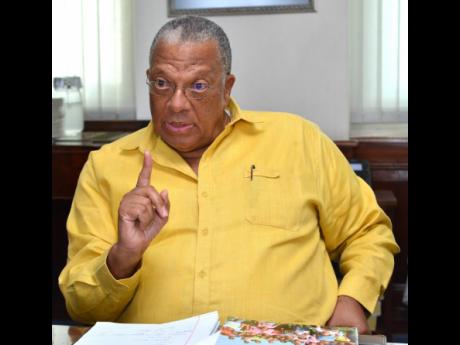Editorial | Integrity Commission falters on the job
Even if the Integrity Commission might argue that the law dictates that the purchasing cost of real estate be disclosed in the statutory declarations of public officials, we do not think it beyond the imagination of the anti-corruption body to request the market value as well.
For, the current commissioners, who have adopted an activist stance and pronounced on the need for legislative reforms, would have been keenly aware that any perceived failure on their part to offer citizens a credible understanding of the wealth of public officials highlights an absence of operational robustness and weakens confidence in its reports.
That’s a rational conclusion to draw from Sandra Minott-Phillips’ claims about the Integrity Commission’s handling of her husband’s latest assets and liabilities filings.
Mrs Minott-Phillips is a prominent lawyer and the wife of the leader of the Opposition, Peter Phillips, who, as a member of parliament, has, by law, to make annual declarations on the state of his finances.
The Phillipses made a joint declaration indicating that they have a net worth of J$185 million, including real estate valued at a jaw-dropping J$3.6 million, or less than US$27,000. Included in the real estate holdings is the Phillipses’ home in one of the capital’s choicest neighbourhoods.
This newspaper’s canvass of real estate and construction professionals, for a credible market value of Dr Phillips’ home, as well as for any other for which filings with the Integrity Commission became available, was short-circuited by Daniel Thwaites’ article in The Sunday Gleaner this week and events subsequent thereto. Mr Thwaites questioned the credibility of the J$3.6 million declared to be the value of the real estate owned by the Phillipses, as well as the J$7 million for Prime Minister Andrew Holness and his legislator wife, Juliet Holness’.
As it turns out, according to Mrs Minott-Phillips, the J$3.6-million value ascribed to the family’s real estate related not only to their home butto a parcel of land, gifted by her father, which she owns separately from her husband. Further, she said, they had placed a combined market value of J$58 million and had told the Integrity Commission so, in clarifications to their initial filing, and in correction to a perceived mistake made by the agency.
The Phillipses purchased their home in 1991 for J$1.5 million, and that year, it appeared, the commission had valued the land at J$2.1 million. Mrs Minott-Phillips insists that the $1.5 million was designated as the purchase price, not the current value.
Assuming these explanations are true, we question why the Integrity Commission failed, in its publication, to capture this information, even as a footnote, as suggested by Mrs Minott-Phillips, who said her “preference would be for it to make clear ... that that value represents the purchase price at the date of acquisition”. It is unfortunate and bizarre that the Phillipses didn’t correct the errors earlier.
High level of gullibility
But the greater focus is on the Integrity Commission for what it appears willing to accept in integrity filings. It demands a high level of gullibility, or suspension of disbelief, for a commission of former judges, lawyers, auditors and public accountants, even if the Phillipses didn’t make the correction, to accept and publish those values for the real estate owned by the opposition leader and his wife.
Indeed, as Daniel Thwaites pointed out, it is incredulous to believe that the home in which Prime Minister Holness lives, even if it was in a seedy Kingston neighbourhood, would value J$7 million. In that regard, it also raises questions about the value placed on Mr Holness’ (unoccupied?) Beverly Hills mansion and if, and whether, it is captured in his assets as business investments. There is a lack of granular clarity in the structure of the commission’s publications.
The matter, however, doesn’t rest with the top two political leaders. There are 82 other legislators and thousands of other public officials who are mandated to submit integrity reports. It begs the question whether serious attention is paid to these declarations, for certainly, current value must be factored in for relevance, not only purchasing cost.
The Integrity Commission isn’t intended to be a decorative body to be showcased only during conversations about anti-corruption efforts. It is expected to be a hard-nosed watchdog confronting a real and debilitating problem.


